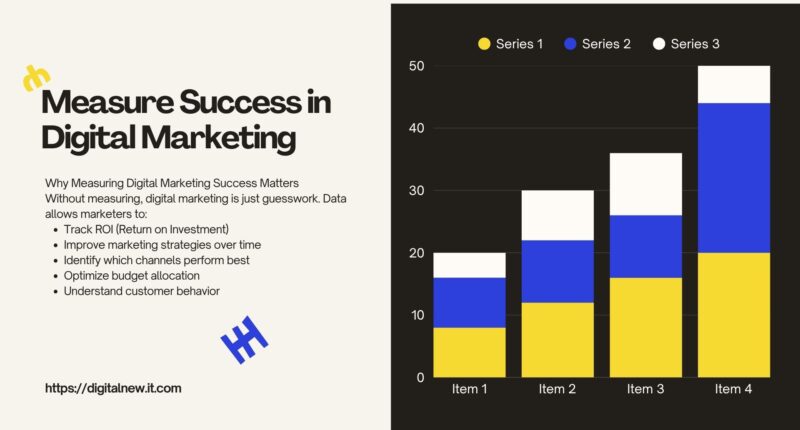How Do I Measure Success in Digital Marketing?
Measuring success in digital marketing is more than just tracking likes or page views. With the right tools and metrics, businesses can understand what’s working, what’s not, and how to improve performance. Whether you’re running ads, creating content, or building a brand online, having a clear strategy to measure success is essential.
Why Measuring Digital Marketing Success Matters
Without measuring, digital marketing is just guesswork. Data allows marketers to:
- Track ROI (Return on Investment)
- Improve marketing strategies over time
- Identify which channels perform best
- Optimize budget allocation
- Understand customer behavior
Key Performance Indicators (KPIs) in Digital Marketing
KPIs are measurable values that show how effectively a campaign is achieving business objectives. Here are the most common KPIs to measure digital marketing success:
1. Website Traffic
Track the number of visitors to your website. Use tools like Google Analytics to monitor:
- Total visitors
- New vs. returning users
- Traffic sources (organic, paid, direct, referral, social)
2. Conversion Rate
This measures how many visitors complete a desired action such as filling out a form, signing up for a newsletter, or making a purchase. A high conversion rate often means your marketing and UX are effective.
3. Cost Per Acquisition (CPA)
CPA tells you how much it costs to acquire one customer. Lower CPA indicates more efficient campaigns. It’s especially useful for paid advertising campaigns like Google Ads or Facebook Ads.
4. Return on Investment (ROI)
ROI is a critical metric that compares how much profit you make from marketing compared to how much you spend. The formula is simple:
ROI = (Revenue from Marketing - Cost of Marketing) / Cost of Marketing5. Engagement Metrics
Engagement helps you understand how users interact with your content. These include:
- Average time on page
- Pages per session
- Bounce rate
- Comments, likes, and shares (for social media)
6. Lead Generation
If your goal is to gather leads, track how many contacts or potential customers are generated through campaigns, forms, or downloads.
Tools to Measure Digital Marketing Success
There are several tools that make digital marketing measurement easier and more accurate:
- Google Analytics: For tracking website traffic, behavior, and conversions.
- Google Search Console: Helps measure SEO performance and organic search presence.
- HubSpot / CRM Tools: To track leads, sales, and customer lifecycle.
- Social Media Analytics: Platforms like Facebook Insights, Twitter Analytics, LinkedIn Analytics offer engagement data.
- SEO Tools: SEMrush, Ahrefs, and Moz track keyword rankings and site health.
Setting SMART Goals for Marketing Success
To effectively measure success, you must set clear goals. Use the SMART framework:
- Specific: Define what you want to achieve
- Measurable: Quantify your goals (e.g., increase traffic by 20%)
- Achievable: Set realistic expectations
- Relevant: Align goals with your business objectives
- Time-bound: Set a clear deadline
Analyzing and Optimizing Based on Results
Once you collect data, it’s important to analyze and adjust your strategy. Here’s how:
- Identify top-performing channels and double down on them
- Analyze underperforming content or campaigns and improve them
- A/B test landing pages, ads, and CTAs
- Review metrics weekly or monthly to stay on track
Conclusion: Measuring Digital Marketing Success is Continuous
Success in digital marketing isn’t about vanity metrics; it’s about driving real results that align with your goals. By setting clear KPIs, using the right tools, and analyzing data regularly, you can turn insights into actions—and actions into results.
Whether you’re a beginner or an experienced marketer, always remember: measure, analyze, optimize, and repeat. That’s the true path to digital marketing success.









